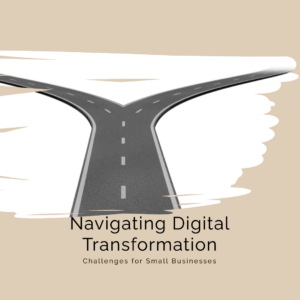Digital Transformation for Small Business: What You Need to Know
Digital transformation has become such a common term that you encounter almost daily. But what does it mean? Why has it become so popular? And what does it entail? I’ll delve into this and more in this article, as I focus more on the small business sector.
Digital Transformation Definition
Digital transformation in small businesses is a strategic process whereby these enterprises harness advanced digital technologies to revamp their operations, enhance competitiveness, and meet evolving customer demands. It involves the adoption of cloud computing, data analytics, AI, and digital tools to streamline processes, reduce costs, and improve customer experiences. Unlike larger organizations, small businesses may prioritize cost-effective solutions and agile adaptations. It aims to leverage digital resources to maximize growth, customer engagement, and operational efficiency within the unique context and constraints of a smaller scale business.
The Evolution of Business in the Digital Age
For small businesses, the evolution in the digital age has brought about both challenges and opportunities. Technological advancements, particularly the rise of the internet, have significantly impacted how small businesses operate.
The internet has leveled the playing field by providing small businesses with a global platform to reach customers far beyond their local markets. Small enterprises can now establish an online presence through websites and social media, allowing them to compete with larger counterparts.
Mobile devices have become invaluable tools for small businesses, enabling them to connect with customers on a personal level. Mobile apps and responsive websites have made it easier for customers to engage with and purchase from small businesses, enhancing convenience and accessibility.
Small businesses have also benefited from changing consumer behaviors. Shifting preferences towards supporting local and sustainable businesses align well with their values and often allow them to connect more intimately with their communities.
However, small businesses face the challenge of keeping up with rapidly changing technology and digital marketing trends. The digital age has created a competitive environment, requiring them to invest in online security, digital marketing strategies, and e-commerce capabilities.
In reality, the digital age offers small businesses a vast array of tools to compete and thrive. It has expanded their reach, enabled personalized customer interactions, and aligned with evolving consumer values. Embracing these digital opportunities while managing the associated challenges is key to success for small businesses in today’s business landscape.
The Impact on Small Businesses
The impact of digital transformation encompasses a wide array of consequences, changes, and transformative effects that ripple throughout the entire landscape of modern commerce and society.
Altered Customer Behavior
Digital transformation has shifted the way customers interact with businesses. From online shopping and mobile app usage to social media engagement, customer behavior has become increasingly digital-centric. This change forces businesses to adapt their strategies to meet evolving expectations.
Market Disruption
Digital transformation often disrupts traditional industry models. New, tech-savvy entrants can quickly challenge established players, reshaping market dynamics and competitive landscapes.
Workforce Transformation
The digital era has redefined workforce dynamics. Remote work, digital collaboration tools, and the gig economy have all emerged as byproducts of digital transformation, altering how people work and where they work from.
Data Economy
Digital transformation has given rise to the data economy. The vast amounts of data generated are not only an asset but also a driver of innovation and business strategy. Businesses must navigate data privacy regulations and harness data analytics to remain competitive.
Societal Implications
Beyond business, digital transformation has societal consequences. It has changed how we communicate, access information, and even how governments and healthcare institutions function. Issues like digital inequality and data privacy have become critical societal discussions.
Global Reach
The digital realm erases geographical boundaries, allowing businesses to reach a global audience. This can lead to both opportunities and challenges, such as dealing with diverse customer preferences and regulatory environments.
Cybersecurity Challenges
As businesses digitize their operations, they become susceptible to cyber threats. The impact of digital transformation includes heightened cybersecurity risks, necessitating robust protection measures.
Environmental Considerations
The energy consumption associated with digital infrastructure, as well as electronic waste, are part of the impact of digital transformation. Businesses are increasingly pressured to adopt sustainable practices.
In essence, the impact of digital transformation is a multifaceted and ever-evolving phenomenon that touches every aspect of modern life. It demands adaptability, resilience, and forward-thinking approaches from businesses and society as a whole to navigate its complexities and harness its transformative potential.
Drivers of Digital Transformation
Small businesses are increasingly compelled to embark on digital transformation journeys due to several interrelated factors that are reshaping the business environment.
Changing Customer Expectations
Modern consumers expect convenience, personalization, and seamless digital experiences. Small businesses must meet these expectations by offering online shopping, mobile apps, and responsive websites. Customers seek effortless interactions, and digital transformation is essential for delivering them.
Market Competition
Intense competition, both from traditional rivals and disruptive startups, forces small businesses to differentiate themselves. Embracing digital tools and technologies enables them to stay relevant, attract new customers, and retain existing ones. It allows them to compete on a broader scale, even in niche markets.
Operational Efficiency
Digital transformation streamlines internal processes, reducing operational costs and improving efficiency. Small businesses can automate repetitive tasks, optimize supply chains, and enhance inventory management. This efficiency not only cuts expenses but also frees up resources for growth and innovation.
Access to Data
Data is a valuable asset in today’s business environment. Digital tools provide small businesses with access to data analytics, enabling them to gain insights into customer behavior, market trends, and operational performance. This data-driven approach informs decision-making and strategy, enhancing competitiveness.
Scalability
Digital technologies offer small businesses the ability to scale up or down quickly in response to market fluctuations. Cloud computing, for example, allows for flexible resource allocation, eliminating the need for large upfront investments in IT infrastructure.
Global Reach
Digital platforms and e-commerce solutions provide small businesses with the opportunity to expand their customer base beyond local boundaries. This global reach can significantly increase revenue potential and reduce reliance on a single market.
Regulatory Compliance
Evolving regulations, such as data protection laws (e.g., GDPR), require businesses to manage and protect customer data responsibly. Digital transformation helps small businesses ensure compliance, avoiding potential legal issues and fines.
Pandemic Resilience
The COVID-19 pandemic highlighted the importance of digital readiness. Small businesses that had already embraced digital tools were often better positioned to adapt to remote work, online sales, and changing customer preferences during lockdowns.
All in all, a convergence of changing customer expectations, intense competition, the pursuit of operational efficiency, and other factors compels small businesses to undertake digital transformation. Those that embrace these changes stand to not only survive but thrive in a digital-first business landscape.
I recently wrote a detailed article discussing further these drivers and what they entail. Read more here.
Benefits of Digital Transformation
Digital transformation offers a multitude of benefits for small businesses, making it a crucial strategy in today’s rapidly evolving modern business.

1. Enhanced Customer Experience
Digital tools enable small businesses to create personalized and seamless customer experiences. From responsive websites to mobile apps and chatbots, these technologies facilitate faster response times, smoother transactions, and improved customer support, leading to higher customer satisfaction and loyalty.
2. Increased Efficiency
Automation and digitization of manual processes reduce the time and effort required for routine tasks. This efficiency translates into cost savings and allows small businesses to allocate resources to more strategic initiatives.
3. Data-Driven Decision-Making
Digital transformation provides access to valuable data insights. Small businesses can analyze customer behavior, market trends, and operational performance to make informed decisions. This data-driven approach minimizes guesswork and enhances strategic planning.
4. Competitive Advantage
By adopting digital technologies, small businesses can compete effectively with larger corporations. They can offer innovative products, agile services, and faster response times, which can set them apart in the market.
5. Business Growth
Digital tools enable small businesses to reach new markets and customer segments. E-commerce platforms and online advertising open doors to global audiences, expanding revenue potential and driving business growth.
6. Cost Reduction
Streamlining operations through digital transformation can significantly reduce overhead costs. Automation, cloud computing, and digital communication tools can replace manual processes and costly infrastructure investments.
7. Improved Marketing and Sales
Digital marketing tools allow for targeted advertising, reaching the right audience with the right message. This precision helps small businesses allocate marketing budgets more effectively and achieve higher conversion rates.
8. Enhanced Collaboration
Collaboration tools, such as project management software and cloud-based productivity suites, promote teamwork among employees, even in remote work settings. This fosters innovation and productivity.
9. Adaptability
Small businesses that embrace digital transformation become more adaptable. They can pivot quickly in response to market changes, making them better equipped to handle disruptions or unexpected challenges.
10. Data Security
While there are security challenges, digital transformation also offers improved data security measures. Small businesses can implement encryption, access controls, and regular security audits to protect sensitive customer information.
11. Sustainability
Going digital can contribute to sustainability efforts. Reduced paper usage, optimized supply chains, and energy-efficient technologies align with environmentally responsible practices.
12. Customer Insights
Small businesses can gain a deeper understanding of their customers through digital channels. Social media analytics, website traffic data, and online surveys provide insights that can inform product development and marketing strategies.
Essentially, digital transformation offers small businesses a wide array of benefits, from improved customer experiences and operational efficiency to data-driven decision-making and competitive advantages. Embracing these technologies can empower small businesses to not only survive but thrive in an increasingly digital and competitive marketplace.
Challenges Faced by Small Businesses

For small businesses, embracing digital transformation can be both exhilarating and daunting. These are some of the challenges faced by small businesses undergoing digital transformation. Small businesses must be aware of these, manage, and mitigate their risks.
- Resource Constraints: One of the most significant challenges for small businesses is limited resources. Digital transformation often requires substantial investments in technology, training, and talent acquisition. Small enterprises may struggle to allocate these resources effectively.
- Resistance to Change: Change can be met with resistance, and the shift to digital operations can disrupt established workflows and processes. Employees may resist adopting new tools and technologies, hindering the transformation’s success.
- Technology Complexity: Keeping pace with the ever-evolving technology landscape can be overwhelming. Small business owners often lack the technical expertise to make informed decisions about which tools and platforms to adopt.
- Data Management: Small businesses generate valuable data, but harnessing this data for informed decision-making can be challenging. Ensuring data security and compliance with regulations adds complexity.
- Competition: Larger corporations often have deeper pockets to fund digital transformation efforts, posing a competitive threat to small businesses. To remain relevant, small enterprises must find cost-effective solutions that offer a competitive edge.
- Customer Expectations: Digital transformation has reshaped customer expectations. Small businesses must adapt by offering seamless online experiences, from e-commerce platforms to responsive customer service.
- Scalability: As small businesses grow, their digital infrastructure must scale accordingly. Poorly planned digital transformation can limit scalability and hinder future expansion.
- Expertise Gap: Finding and retaining employees with the necessary digital skills can be challenging, especially in highly competitive job markets.
- Cybersecurity Concerns: As small businesses digitize their operations, they become potential targets for cyberattacks. Ensuring robust cybersecurity measures is crucial but can be complex.
While these challenges are formidable, small businesses should view digital transformation as an opportunity rather than a threat. External consultants can be invaluable allies in this journey. These experts bring the necessary technical knowledge, experience, and strategic insights to guide small businesses through the labyrinth of digital transformation. With their support, small businesses can navigate these challenges, unlock new growth opportunities, and position themselves for a prosperous digital future. Embracing digital transformation is not just a necessity; it’s a pathway to resilience and success in today’s digital-first world.
Digital Transformation Roadmap
Initiating a digital transformation journey for a small business is a pivotal step towards staying competitive and relevant in today’s tech-driven market. Here’s a high-level overview of the key steps to get started:
1. Assessment and Vision Setting
Begin by evaluating current business processes, technology infrastructure, and customer needs. Identify pain points and opportunities where digital solutions can make a significant impact. Set clear, achievable goals and a vision for what digital transformation means for the business.
2. Cultivate Digital Literacy
Ensure that the team has the necessary digital skills and knowledge to support the transformation. This may involve training, hiring, or partnering with experts who can guide the process.
3. Data Strategy:
Data is the backbone of digital transformation. Define how the business will collect, store, analyze, and leverage data to make informed decisions and enhance customer experiences.
4. Select the Right Technology
Choose technologies that align with your goals and budget. This could include cloud computing, data analytics tools, customer relationship management (CRM) systems, and e-commerce platforms.
5. Process Optimization
Reengineer existing processes to be more efficient and digitally integrated. This might involve automating repetitive tasks, streamlining workflows, and improving collaboration through digital tools.
6. Cybersecurity and Compliance
Prioritize security measures to protect your digital assets and customer data. Ensure that your digital transformation adheres to industry regulations and standards.
7. Customer-Centric Approach
Focus on enhancing the customer experience through digital channels. Develop a user-friendly website, mobile app, or e-commerce platform to engage with customers and gather feedback.
8. Change Management
Communicate the transformation plan effectively to your employees, involving them in the process and addressing their concerns. Encourage a culture of adaptability and innovation.
9. Pilot Projects
Start with smaller digital initiatives to test and refine your strategies before scaling up. These pilot projects can provide valuable insights and mitigate risks.
10. Iterative Approach
Digital transformation is an ongoing process. Continuously monitor and assess the impact of your initiatives, gather feedback, and adapt your strategy accordingly.
11. Measuring Success
Establish key performance indicators (KPIs) to measure the success of your digital transformation efforts. Regularly assess how they align with your initial goals.
12. Scaling Up
Once you’ve achieved success with initial projects, consider expanding your digital initiatives to other areas of your business.
Remember that digital transformation is not a one-size-fits-all endeavor. The specific steps and strategies will vary based on your industry, business model, and goals.
Conclusion
In this article I discussed digital transformation for small businesses. The definition of digital transformation, evolution of business in the digital era, the impact of digital transformation, and the drivers of digital transformation. Furthermore, I discussed the benefits of digital transformation for small businesses, the challenges they face when embarking on digital transformation, and the roadmap of successful digital transformations.
If there is one key take away that I would like to impress on you, it is that business strategy must always drive digital transformation, not the other way around.
Reach Out
Feel free to reach out to me to discuss your business’ digital transformation outlook, concerns, or strategy.

Leave a Reply
You must be logged in to post a comment.